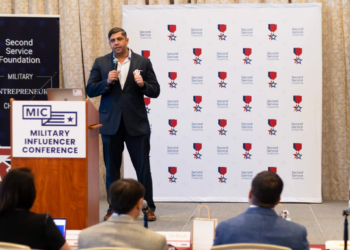While the US military has modernized its force, much of its family support system continues to reflect assumptions about family life that are, in many cases, no longer accurate, according to a new report.
“Military spouse unemployment: exploring solutions to a local problem of national importance,” was compiled by The Deloitte Center for Government Insights and released this week. The report takes a nuanced look at why nearly a quarter of military spouses are unemployed, and just over half are underemployed, despite the fact that the military provides robust spousal employment programs.
Finding reveal that the spousal experience can influence whether a service member stays in or leaves the military and it offers a variety of specific recommendations to address these challenges.
About the report
Rosemary Williams, specialist executive at Deloitte who worked on the report, spoke about the document and the key takeaways.
“Data don’t lie. If we have good data, we can solve problems,” Williams said.
By leveraging the power of data, the team at Deloitte was able to explore the modern military family and the unique needs that they face. Deloitte’s expertise in many of these markets, allowed the team to take a granular look at the reasons spousal employment remains elusive for so many.
Here are key takeaways from the report:
The military family has changed
Per the survey’s analysis, assumptions about military spouses include the following: the non-serving spouse is always available to support service-related needs, one stream of income is enough for a family to thrive, or the modern military family resembles those of previous generations. Many of these assumptions no longer fit the modern military spouse.

Currently, 92% of military spouses are women, and 80% are 40 years old or younger per the Blue Star Families’ 2018 annual survey of military families. The percentage of spouses who hold bachelor’s or advanced degrees is 45% compared to 33% of the general population. For military spouses, finding and building the right career can be elusive due to frequent PCS moves, the pressures of being the primary at-home parent and managing a household without a spouse for extended periods of time.
For many modern spouses, careers provide a way of staying connected, especially when the constant integration into new communities leaves many feeling disconnected. Demographic trends further expand upon this theme and reflect the importance of career. Millennials (born between 1981 and 1996) or Generation Z (born in 1997 or after) have different expectations about gender roles. Studies of these key demographics show that women are more professionally ambitious than their male peers and men want to equally balance being a caregiver and breadwinner. Careers are paramount for both demographics.
Spouse employment and retention go hand in hand
With the challenges surrounding spousal employment, the survey finds that financial insecurity and unfilled personal expectations may lead to a pronounced level of dissatisfaction for the non-serving spouse. This dissatisfaction has a direct impact on the retention of skilled service members. Per the survey’s analysis, the military is already hard-pressed to recruit top talent, especially in technical fields where pay is considerably higher in the private sector.
Ultimately, the report notes that greater satisfaction with military life with fewer obstacles for military spouses looking for employment is often key to retaining the talent that the modern military requires to fight modern wars.
Location, location, location
Framing military spouse unemployment as a monolithic problem may be part of the problem according to this analysis. The survey highlights that seeking employment is not one problem, but many different problems depending on where you live as the size and vitality of labor markets near major military bases can vary widely.
Well over half of all military spouses live in areas with below-average availability of work. The survey’s research indicates that of the military spouses who live on or near the largest bases, 44% live in labor markets with negative availability of jobs, meaning there are fewer jobs than job seekers.
In hot labor markets, like Washington, D.C. or Tacoma, Washington, it can be less forgiving for applicants whose resume may not reflect consistent career growth or experience beyond a year or two in each job—issues many military spouses experience.

Different challenges should equal different solutions
Recognizing that military spouse under- and unemployment is not one singular problem is the first place to start. The report identifies both existing and new opportunities as room for growth.
The report suggests efforts by the military could include the following five solutions to connect spouses to existing opportunities:
- Provide spouses with the tools for remote work: including computers, video conferencing software, or even co-working spaces.
- Accelerate licensing requirements and interstate transfers recommended by the 2020 National Defense Authorization Act.
- Develop a consortium of DoD’s Military Spouse Employment Partnership program that can offer military spouses alternative opportunities if they can’t retain their previous positions.
- Generate “future of work” fact sheets for employers to highlight the quantitative and qualitative benefits of hiring military spouses.
- Offer job-centric upskilling programs to help military spouses gain skills for in-demand jobs.
The report recommends that stakeholders should create new opportunities including entrepreneurship, career transitions and continuing education.
“Entrepreneurs and military spouses are the perfect fit,” Williams said.
Specifically, it highlights the five following ideas:
- Increase entrepreneurial support via networking groups and mentorship programs.
- Provide educational programs to help entrepreneurs start, grown and succeed in their business.
- Improve access to resources such as workspaces, microlending, advising or professional services.
- Provide coworking spaces for innovation to help share best practices.
- Sponsor or create business accelerators specifically for military spouses that would provide access to military entrepreneurs, investors and other funding resources.
COVID-19’s impact
The impact of the current COVID-19 crisis has drastically impacted economies across the country. As a result, there may simply be fewer jobs available for military spouses even in areas near bases that previously had strong economies. Many of the industries that offered easier entry opportunities to military spouses, such as retail, accommodation, social assistance and food service were among the hardest hit by the pandemic.
Per the survey, the situation underscores the importance of new ways of thinking about the best ways for military spouses to have a career and earn a living wage.
On the plus side, the pandemic has reframed many of the discussions about the benefits of telework and portable careers.
Conclusion
The report shows that military spouses are deserving of support in finding meaningful employment, not only for their sacrifices, but to keep military families strong, resilient and ready for the future and present challenges that the military will face.
For Williams, now is a good time to explore these complex issues.
“There’s an opportunity to leverage the pandemic as a strategic pause and find out what we can we learn about the last few months to inform policies and programs to reflect the modern military family to drive the data to serve military families,” she said.
For more information about the report, visit The Deloitte Center for Government Insights.
Read comments






























